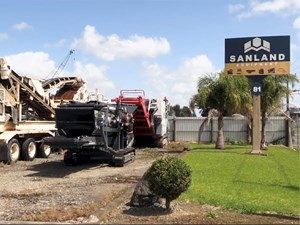Comment: Managing cash flow
NZ Trucking Association CEO David Boyce shares a few tips on how to successfully manage business cash flow
The trucking industry tends to be a mirror image of what’s happening in the wider New Zealand economy.
When wider business confidence is low, government infrastructure spending has slowed down, or export commodity prices are down, then this can quickly reflect on the financial viability of many businesses within the trucking industry.

Certainly, many people in the trucking industry are reporting that times are tough at present for some trucking operators due to a downturn in work and a high level of competition within the industry.
So, I thought it was good timing to repeat the messages from some earlier articles about managing your business cash flow.
Successfully managing your business cash flow is essential for the survival of your business, especially when times are tough, but also for the future growth of your business. Every business needs good cash flow to be able to meet their commitments and pay their expenses on time. There’s an old saying in business that ‘Cash is King’.
Cash is the lifeblood of any business; it’s the fuel that keeps your business engine running, and without it, that engine will soon stop running. Without cash coming in, real profits are just an illusion. Many a business that appear to be profitable each year when the annual accounts are completed have gone broke because they have not got the basics right of getting more cash in than cash going out.
Basically, there are two types of cash flow:
Positive cash flow. This occurs when the cash coming into your business from sales, accounts receivable, etc. is more than the cash going out of your business through accounts payable, expenses, wages, etc.
Negative cash flow. This is the reverse when the cash going out of your business is greater than the cash coming in. Not a good position to be in.
Unfortunately, many transport operators can’t predict the future, especially when it comes to things like unforeseen maintenance, such as a major engine failure requiring total replacement. This can quickly make a $50,000 plus dent in your cash flow. They also can’t be certain that their customers will pay their invoices on time.
It’s important that your business reduces the time gap between when you pay for expenses and when you receive income; the smaller the gap, the more cash you will have available to pay for your regular business costs. Transport operators must provide a service to their customers before being paid, to be able to make a profit.
It’s critical that you have control over your cash flow so that you can pay staff and suppliers before you have been paid by your customers. If you can’t do this, then you won’t be able to provide service to your customers, or to make a profit.
Don’t confuse cash in the bank with being profitable. Making a profit is when your business earns more in a year’s trading than it spends on expenses. Many a business will make an end of year profit but still have times during the year where it’s struggling to have enough cash to cover its expenses.
Preparing a 12-month cash flow forecast can help you to think ahead in your business. It can help you to look at how much you may need to borrow, and at how much cash you will require each month.
Accurate forecasts are usually a requirement from any lending institution. It’s important that your forecast is based on realistic information and not on wishful thinking. An accurate forecast will help you to identify in advance any potential shortfalls in your budget.
Your cash flow forecast should identify all your business income sources and incoming cash amounts, along with all your outgoing cash expenses. It should have an opening and closing bank balance to track progress.
You probably don’t need an accountant to produce a forecast but getting regular professional advice is advisable. Most businesses nowadays will be operating an accounting software package such as XERO or MYOB; both are great, as they can help you to produce an accurate cash flow forecast.
Your forecast should be reviewed and updated regularly, as your circumstances will always be changing. It should not be a one-hit wonder but should be integrated as part of your normal business practices. Waiting until your accountant has completed your annual tax return is not the time to find out if you’re financially viable.
Some transport operators see growth as a solution to their cash flow problems, only to find that as they have grown this has made the situation even worse, as they did not have the basic principles under control before they expanded the size of their business.
Improving your cash flow management procedures is the first step.
You should be:
- Keeping accurate and up-to-date records
- Invoice accurately and promptly
- Include payment terms on all invoices along with your internet banking details
- Bank any manual payments immediately
- Keep accurate records of customer payments; this will help you to track slow payers
- Have a robust credit policy
- Agree payment terms upfront with all new customers
- Conduct credit checks on new customers
- Review credit terms with customers who are slow to pay e.g. put them on a cash-only basis
- Consider prompt payment discounts and penalties for late payments
- Issue reminders as soon as a payment date is missed and follow up immediately
- Review your payment terms with suppliers
- Talk to your suppliers to see if they will offer a discount for prompt payment
- Pay your suppliers promptly; they are more likely to provide you with favourable terms
- Consider leasing rather than buying for major assets
- Use your overdraft for cash shortfalls rather than further borrowing
- Considering factoring debt to improve cash flow
- Review your debt structure to ensure that is structured for the lowest cost to your business
If your business has seasonal peaks, you will need to adjust your cash flow forecast to match your trading conditions.
Any surplus cash generated during peak trading periods should be kept in an on-call bank account to be used as a reserve fund for quieter trading periods. It’s also prudent to talk to your bank, armed with your accurate cash flow forecast, to make sure that you have an appropriate overdraft facility that matches your business requirements.
If you have a cash flow problem, it’s important that you act immediately. Seek professional advice. Many are too embarrassed to seek help when needed and leave it too late. Talk to your financial advisor, finance provider, and accountant.
Be sure to share your cash flow and business forecasts with them. Break any bad news promptly. Explain what you’re doing to solve the problem, and don’t make any unrealistic promises.
Have you got a trusted business mentor you can call on? If you need to give NZ Trucking Association a call please do, we can help, we regularly review transport businesses on behalf of our members and can provide good common-sense advice based on our extensive industry knowledge.
Keep up to date in the industry by signing up to Deals on Wheels' free newsletter or liking us on Facebook.





.jpg)


.jpg)








